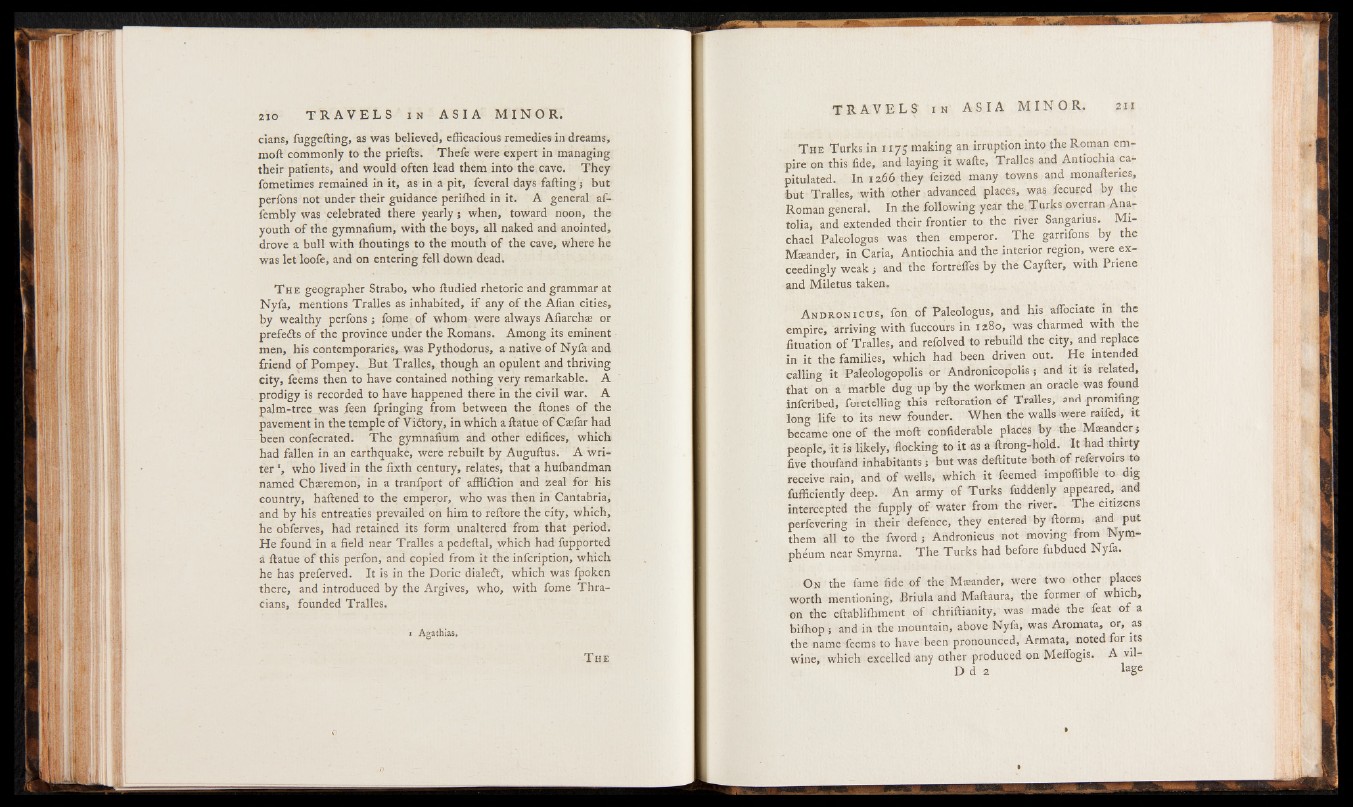
cians, fuggefling, as was believed, efficacious remedies in dreams,
moft commonly to the priells. Thefe were expert in managing
their patients, and would often lead them into the cave. They
fometimes remained in it, as in a pit, feveral days falling; but
perfons not under their guidance perilhed in it. A general af-
fembly was celebrated there yearly j when, toward noon, the
youth of the gymnafium, with the boys, all naked and anointed,
drove a bull with fhoutings to the mouth of the cave, where he
was let loofe, and on entering fell down dead.
T he geographer Strabo, who ftudied rhetoric and grammar at
Nyfa, mentions Tralles as inhabited, if any of the Afian cities,
by wealthy perfons j fome of whom were always Afiarchas or
prefedts of the province under the Romans. Among its eminent
men, his contemporaries, was Pythodorus, a native of Nyfa and
friend of Pompey. But Tralles, though an opulent and thriving
city, feems then to have contained nothing very remarkable. A
prodigy is recorded to have happened there in the civil war. A
palm-tree was feen fpringing from between the Hones of the
pavement in the temple of Vidtory, in which a flatue of Csefar had
been confecrated. The gymnafium and other edifices, which
had fallen in an earthquake, were rebuilt by Auguflus. A writer
% who lived in the fixth century, relates, that a hufbandman
named ChEeremon, in a tranfport of afflidtion and zeal for his
country, haftened to the emperor, who was then in Cantabria,
and by his entreaties prevailed on him to reftore the city, which,
he obferves, had retained its form unaltered from that period.
He found in a field near Tralles a pedeflal, which had fupported
a flatue of this perfon, and copied from it the infcription, which
he has preferved. It is in the Doric dialedt, which was fpoken
there, and introduced by the Argives, who, with fome Thracians,
founded Tralles.
i Agathias.
T h e
T he Turks in 1 175 making an irruption into the Roman empire
on this fide, and laying it wafte, Tralles and Antiochia capitulated.
In 1266 they feized many towns and monafleries,
but Tralles, with other advanced places, was fecured by the
Roman general. In the following year the Turks overran Anatolia,
and extended their frontier to the river Sangarius. Michael
Paleologus was then emperor. The garrifons by the
Mte ander, in Caria, Antiochia and the interior region, were ex-
ceedingly weak; and the fortreffes by the Cayfler, with Priene
and Miletus taken.
A n d r o n i c u s , fon of Paleologus, and his affociate in the
empire, arriving with fuccours in 1280, was charmed with the
fituation of Tralles, and refolved to rebuild the city, and replace
in it the families, which had been driven out. He intended
calling it Paleologopolis or Andronicopolis; and it is related,
that on a marble dug up by the workmen an oracle was found
infcribed, foretelling this reftoration of Tralles, and promifing
long life to its new founder. When the walls were raifed, it
became one of the moft confiderable places by the Masanderj
people, it is likely, flocking to it as a flrong-hold. It had thirty
five thoufand inhabitants; but was deflitute both of refervoirs to
receive rain, and of wells, which it feemed impoffible to dig
fufficiently deep. An army of Turks fuddenly appeared,^ and
intercepted the fupply of water from the river. The citizens
perfevering in their defence, they entered by florm, and put
them all to the fword j Andronicus not movi-ng from Nym-
phéum near Smyrna. The Turks had before fubdued Nyfa.
On the fame fide of the Msander, were two other places
worth mentioning, Briula and Maftaura, the former of which,
on the eftablifhment of chriilianity, was made the feat of a
bifhop; and in the mountain, above Nyfa, was Aromata, or, as
the name feems to have been pronounced, Armata, noted for its
wine, which excelled any other produced on Meflbgis. A vil
D d 2 lage